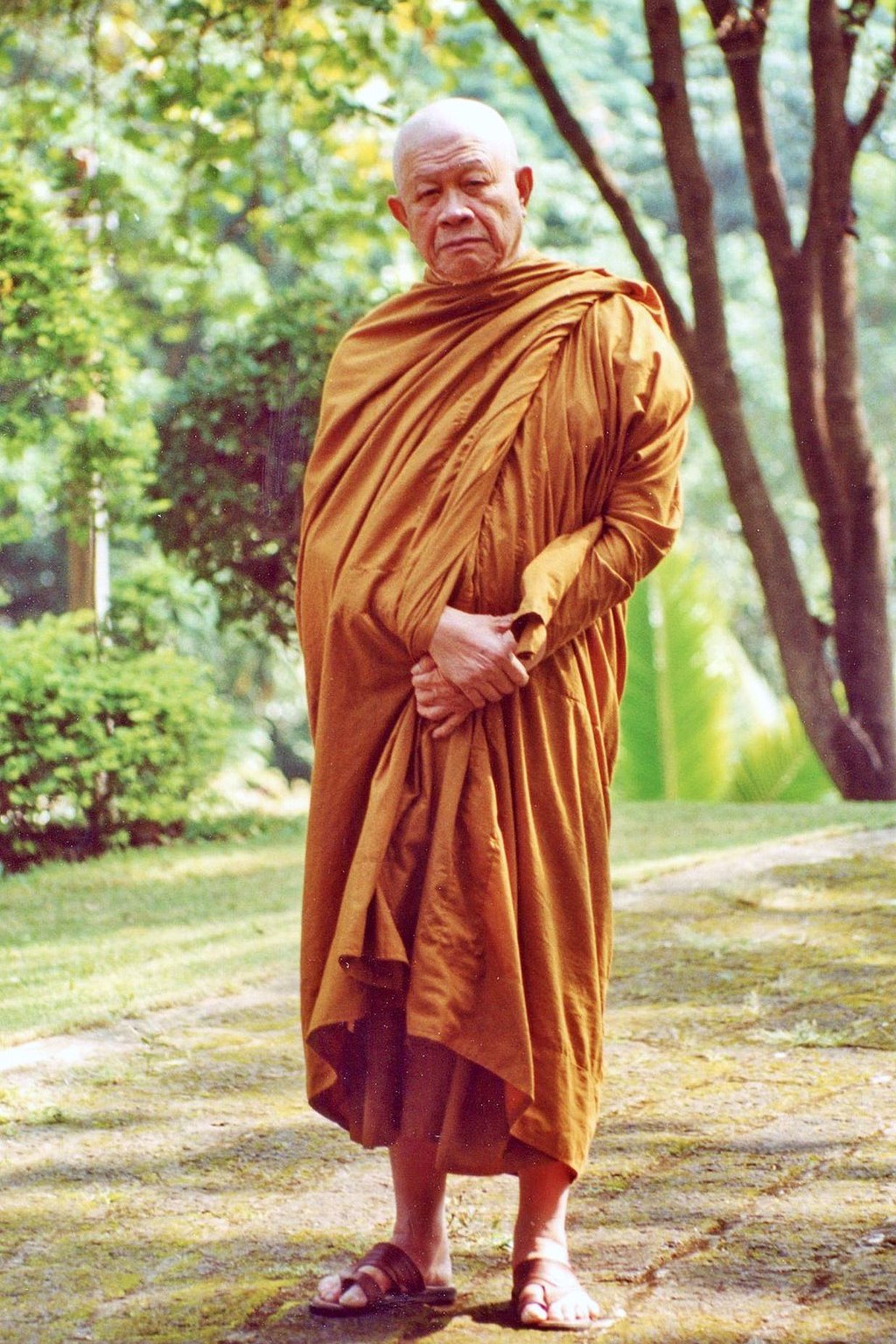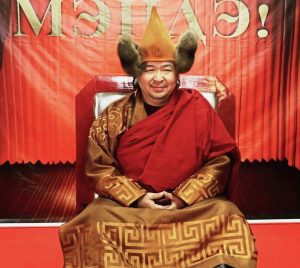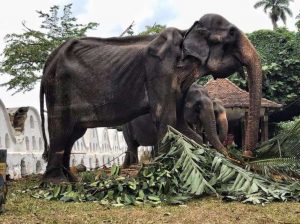The Thai monk and meditation master Luang Phor Viriyang Sirintharo cultivated a meditation method that teaches one how to avoid states of mental stress and to develop tranquility and equanimity, through finally understand how all things are impermanent and eventually break up into nothingness.
In an ignorant, unfocused, and undeveloped mind, severe mental vibrations can arise, with stormy waves of energy swirling and crashing, jumping and jangling the nervous system—sometimes even to the point that the mind becomes unstable. Whereas, by comparison, in a mind that has been properly centered and developed with steady, focused attention, skilled mindfulness may be directed toward any location in which a potentially unwholesome sensation may be arising within mind-consciousness that needs immediate attention and eradication for the sake of mental security and equanimity.
The mind that is attentive to approaching intrusions has been ingeniously compared by the Buddha to the way a watchful spider remains still in the center of its web, until it comes time to rush out to catch and entangle an approaching intruder before it has time to damage the web.

Just as the spider has a web set to warn and protect against invading intruders, so the watchful mind might figuratively be said to have its own mental security net, which works as an early warning system of protective vibrations, spread out in all directions and prepared to give alarm whenever a potential, unprofitable mental impulse may approach with the intention of making unskillful contact and causing a harmful reaction. Thus, the well-centered, attentive security spider of the watchful mind can rush out and catch harmful invasions of ill-intentions before they have time to become mental and physical actions.
In short, being mindful means developing discernment to provide prior warning to allow the practitioner to prevent unprofitable intentions and harmful physical actions from arising. Developing mindfulness cultivates a sustainable state of mental health that may be maintained in an unstable world that tends toward impure intentions, based on ignorance, delusive perceptions, and inflated expectations, which themselves are merely products of the wandering, grasping, constantly scavenging, unsatisfied human mind.
To reiterate, as sila (Right Conduct) is cultivated and ardently practiced, and emotional imbalances and restlessness are gradually reduced and replaced by tranquility and equanimity, the mind becomes well-founded and established in its concentration. Thus the attentive mind will be more clearly and quickly able to detect arising negative vibrations in the flow of the psycho-physical mind-body energy, thereby developing the skill needed to relinquish and abandon negative tendencies connected thereto, prior to their becoming harmful actions.
Moreover, when the mind comes to the point at which it begins to develop discernment, it slowly becomes aware of slight and even unexpected insights that further open and clear the path to the way of insight knowledge and wisdom.
Luang Phor Viriyang provides us with yet another analogy, explaining how “ice cubes work to diminish the heat and energy in a pot of boiling water, when we see mental conflicts arising, which can heat up into internal energy-combustion—much in the way the attentive part of the mind, which is clearly aware of what is occurring, can act with appropriate understanding and discernment to cool the heat of the mental conflict down.”
Ideally, we need to develop wisdom to make the mind into “a cool, still pool.” But since mere knowledge is not yet practice, and since knowing is not yet doing, this is easier said than done. As a clever proverb states: “It is easier to fall into the pot than it is to get out of it.”
Indeed, Luang Phor Viriyang warns us that there are those who, while they can differentiate between right and wrong, cannot refrain from immoral thoughts and actions because their power of mind is too weak and still dominated by the senses and emotions.
To reiterate the point, when the mind is ignorant and deluded as a result of the heat that rushes in whenever any of the six sense doors have been left open, whatever coolness of wisdom and goodness we may have previously developed and accumulated will still be too weak and will, as yet, not have sufficient power to curb and quell inflammatory emotions.
Many of us are like that.
Most of us are aware that we lack sufficient wisdom to counter arising emotions, and some of us understand that we must act with persistence, diligence, and energy, continually cultivating our meditative powers to a point of incisive sharpness. Only then are we capable of catching and cutting out the sources of short-circuiting psycho-physical energy clusters while they are in the stages of potentially arising, but not yet reaching the actual instant of becoming.
The secret to success in mental cultivation is knowing that within each of us there is the one who knows; the cooling power of the detached mind, which watches the combustible part of the mind, and is capable of pin-pointing, intervening, and extinguishing potentially destructive, explosive powers.
Luang Phor Viriyang, in an alternative analogy, explained that the application of such wisdom might be compared to a sharp needle that is able to run through every kind of fabric. If the needle is dull, it cannot pierce through any fabric. A person with knowledge of manifested insight wisdom (nana) has a sharp mind. That person is capable of comprehending various kinds of knowledge as the manifested nana emanates from the controlling power of mind.
Elsewhere, Luang Phor Viriyang, approaching the topic from another angle, states that insight is the capability of discerning the true nature of things—the way they really are—and that we must develop the ability to discern the true nature of any physical body as impermanent and illusory; in a state of flux, constantly in the process of arising and ceasing.
This is true for all solid-state physical bodies, including the human corporeal body, which is subject to partial decay at every moment, and to total decay when it ceases with death. Most of us, being in a state of denial of the truth of the process of physical dissolution and decay within our own bodies, dislike the prospect of seeing ourselves in an impermanent way.
Insight meditation teaches us to see the truth of the impermanence of all things. Insight meditation teaches us to see the impermanence of solid things that to us had formerly seemed so permanent, such as the sea and the sky and the mountains. Insight meditation teaches us to see that all phenomena are temporary—in a state of flux and dissolution—according to the laws of arising and ceasing of vibrations of energy-waves and particles in nature.
Furthermore, according to Buddhist cosmology, the Earth and the Sun and the Moon and even the entire galaxy are impermanent and will implode or explode and one day just disappear into nothing but infinitesimal, vibrating energy particles. So how can we imagine that we are permanently here to stay? How can any person be permanent in a world in which absolutely everything else is impermanent?
References
Viriyang, Luang Phor. 1999. Meditation Instructor Course. Bangkok: Willpower Institute (private printing of internal handout).
Related features from BDG
Within Chaos, There Is a Refuge for Meditation
About Right Concentration
Silence












